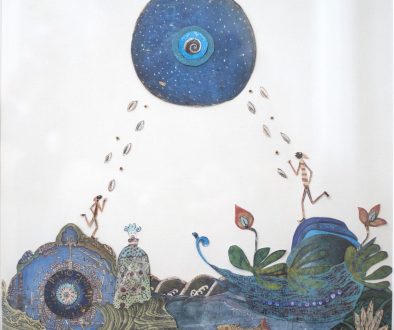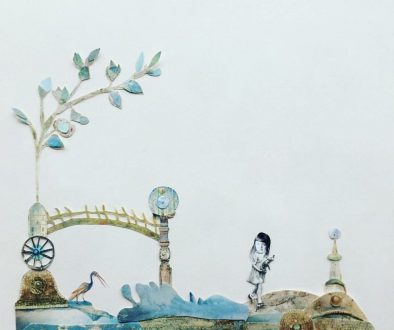The Kabbalah Of Forgiveness: An Artistic Journey

Forgiveness is our superpower. Its grace can astonish the hardest of hearts and wipe the rage from our eyes. Yet its power is often no match for our resentment – that we nurse like a firstborn child swaddled in the tears of injustice – afraid our existence depends on the tally of grievances we hold aloft for each other to see. Rub your nose in this – we cry, all the while our hearts die with the loneliness our demand for perfection creates.
To forgive is to sacrifice our firstborn; to burn that note to self – I will not trust you again. To release the hypocrisy of our judgement and stand naked in front of each other and sigh with the knowledge that we are all the same.
It is not a onetime action, but a state of being that must be seized upon and wilfully practiced. It hurts. It hurts deep. But oh, when it is possessed; we are never more beautiful.
Finding a way through the brick wall of resentment that surrounds our hearts – and continually impedes our relationships with loved ones and positive interactions with others – is not an easy task; rather, it is task that requires a teacher and a guide.
_________________________
Last year I had the supreme good fortune to stumble upon the lectures and writing of Dr Henry Abramson. The excellence of Dr. Abramson’s teaching resides in his ability to speak to the heart as well as the mind; filling both with knowledge so rich it has the power to transform.
One such book and lecture series is Dr Abramson’s Kabbalah of Forgiveness; a commentary on the classic 16th century work by Rabbi Moshe Cordovero, called Tomer Devorah (trans: Date Palm of Devorah). The Tomer Devorah is essentially a Kabbalistic how-to-manual; specifically, how to imitate God.
Dr. Abramson’s commentary addresses the section in the Tomer Devorah that deals with God’s mercy and provides a step by step guide through the 13 levels of mercy, or forgiveness. Rabbi Cordovero’s ideas regarding forgiveness are as relevant to today as there were in the 16th century; and Dr Abramson’s warmth and down-to-earth teaching style make those ideas accessible to all.
The following is not an attempt to teach the Kabbalah of the Forgiveness (why listen to the donkey when the master has a YouTube channel). Rather, it is a visual documentation of my personal journey through the 13 levels of forgiveness.
NB: The titles below reflect the pictures themselves – which may only be one aspect of a given level. In cases where the picture title differs from that of the specific level, I have included the latter in brackets.
All pictures are hand-cut, 12″ x 12″ paper on paper collages.
THE INSULTED KING

Level One concerns the need to forgive those people that take us for granted (or bite the hand that feeds them). It draws on the analogy of a king who endures insult from his subjects, yet continues in his beneficent attitude and actions towards them. It further reminds us that God’s mercy and creative energy continues to sustain existence, despite the deplorable things we do – individually and collectively; and encourages us imitate such forgiveness.
WHOSE K’TEGORS ARE THESE? (Let it Go)

Level Two is somewhat complex in its Kabbalistic ideas – especially for the novice. However, in essence, it recommends letting go of the need to hold people to account for their behavior towards us, on the grounds that if we look closely, we are no better. To illustrate this, it talks of the Kabbalistic idea of k’tegors – malevolent destroyers that feed on the energy of the people who created them through their misdeeds. Personally, I find it sobering to think of a band of metaphorical k’tegors following me around; and it gives me pause for thought when on the verge of taking offence at someone else’s behavior.
PART OF THE PROCESS (Take Care of it Personally)

Level Three acknowledges that when someone we are close to messes up in a major way, it is tempting to walk away and leave them to it – they made the mess, they should clean it up! However, level 3 suggests the opposite. It says, if someone we love has made a mess and is truly sorry, it is incumbent upon us to be part of the process by which they transform their life and gain forgiveness – both in our eyes and theirs.
IN THE SAME BOAT (Remember we are family)

Level 4 reminds us that life is hard and we all mess up; as such, we should go easy on each other. After all, we are all in the same boat.
RELEASE THE ANGER

Level 5 reminds us of the destructive and debilitating nature of anger. It is very tempting, when we are angry at a loved one – over a perceive injury or insult – to lash out at them and let them bear the brunt of our anger. However, as this picture illustrates, anger does not resolve relationship issues; rather, it makes them more perilous and puts us in a situation where we have very little control over the outcome.
WHO MAKES YOUR LUNCH?

Level 6 reminds us that, when we need to forgive someone, we should think about the nice things they do for us – those simple everyday things that sustain and elevate us. When discussing this level, Dr Abramson relays the touching example of how his wife makes his lunch every day; reminding us that being aware of the grace conferred by such actions and not taking them for granted, helps us maintain a forgiving attitude towards our loved ones.
BUILDING A FENCE (A Knot is Stronger)

Level 7 concerns the need to forgive those who betray us. This is an extremely difficult thing to do, especially if we cannot be sure the person will not betray us again. To counter this difficulty, one of the things Dr. Abramson talks about is the need to build fences. If someone we love sincerely wishes to negate a particular behavior pattern that has caused us and the relationship harm, then they are well advised to build a fence around themselves so as to limit access to the detrimental behavior. If our loved one goes to the trouble of building a fence, we should take it as a sign they are serious about not hurting us in that way again; and so can be begin the process of forgiveness.
MAINTAIN A CORE OF LOVE

Level 8 builds on level 7 and talks about the need to not only forgive our loved ones, but also to let them back into our heart.
THE SCAPEGOAT (Bury the Past)

Level 9 brings up the idea of the scape goat and the need to offset our anger so that it does not infect the person we love – even though they may be the true target and instigator of the anger. Personally, I recommend finding a creative outlet for such feelings.
The preceding levels concern loved ones – friends and family; the remaining levels concern acquaintances – those people we may not be particularly close to.
THE HOOK (Do the Right Thing Anyway)
Level 10 is about letting everyday folk off the hook. It recalls level 4 – in that we are all in the same boat, life is hard and we all make mistakes – and encourages us to go easy on other people.
SERVE AND PROTECT (Do More for Those Who Do More)
Level 11 encourages us to confer extra forgiveness on those we know to be good people, who help others by giving of their time and/or resources. It is tempting when good people do the wrong thing, to want to knock them off their pedestals; but this level instructs us not to. Rather, we should go out of our way to forgive and protect them.
FAMILY TREE (Remember Where they Came From)
Level 12 recognizes the fact that some people have few redeeming qualities and generally make the lives of those around them miserable. In such cases, it can be helpful to consider the person’s family – both living and dead – and forgive them for their family’s sake.
THE MOMENT OF INNOCENCE
Level 13 recognizes that even level 12 may not be enough and asks us to consider that the person in question was once an innocent baby. By doing so, we can become aware of their inherent vulnerability and find it in our hearts to forgive them.
___________________________
So there it is dear reader, a small taste of the Kabbalah of Forgiveness. I sincerely hope it inspires you to access Dr Abramson’s lectures and book for yourself and embark on what is a remarkable and life changing journey. I should warn you though, as remarkable as that journey is, it is also arduous and, at times, deeply uncomfortable. You may be shocked – as I was – to realise how attached to your resentment and long list of injustices you are. Although you will be loath to part with them, part you must. But do not fear, that empty nest will soon be filled with love.






